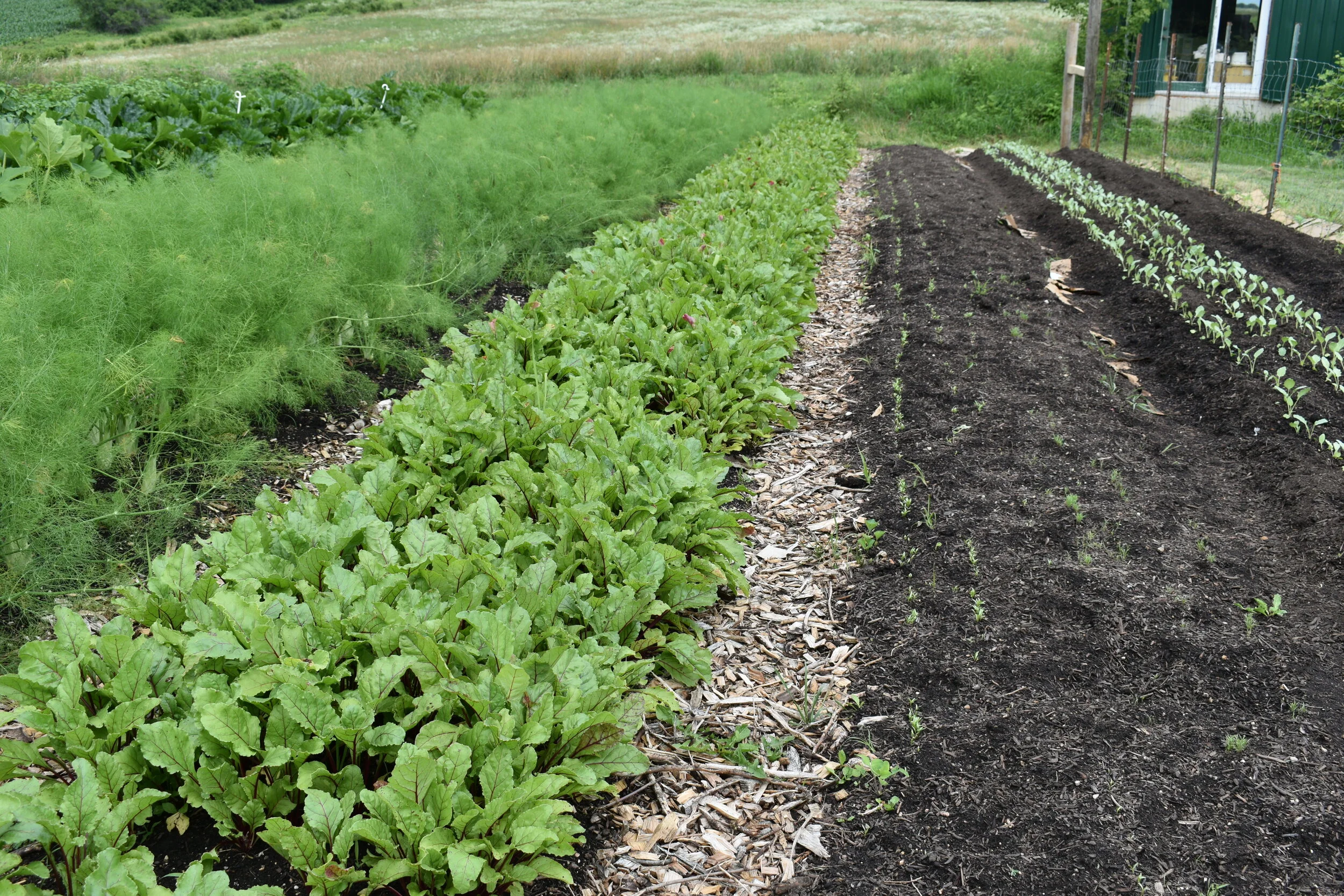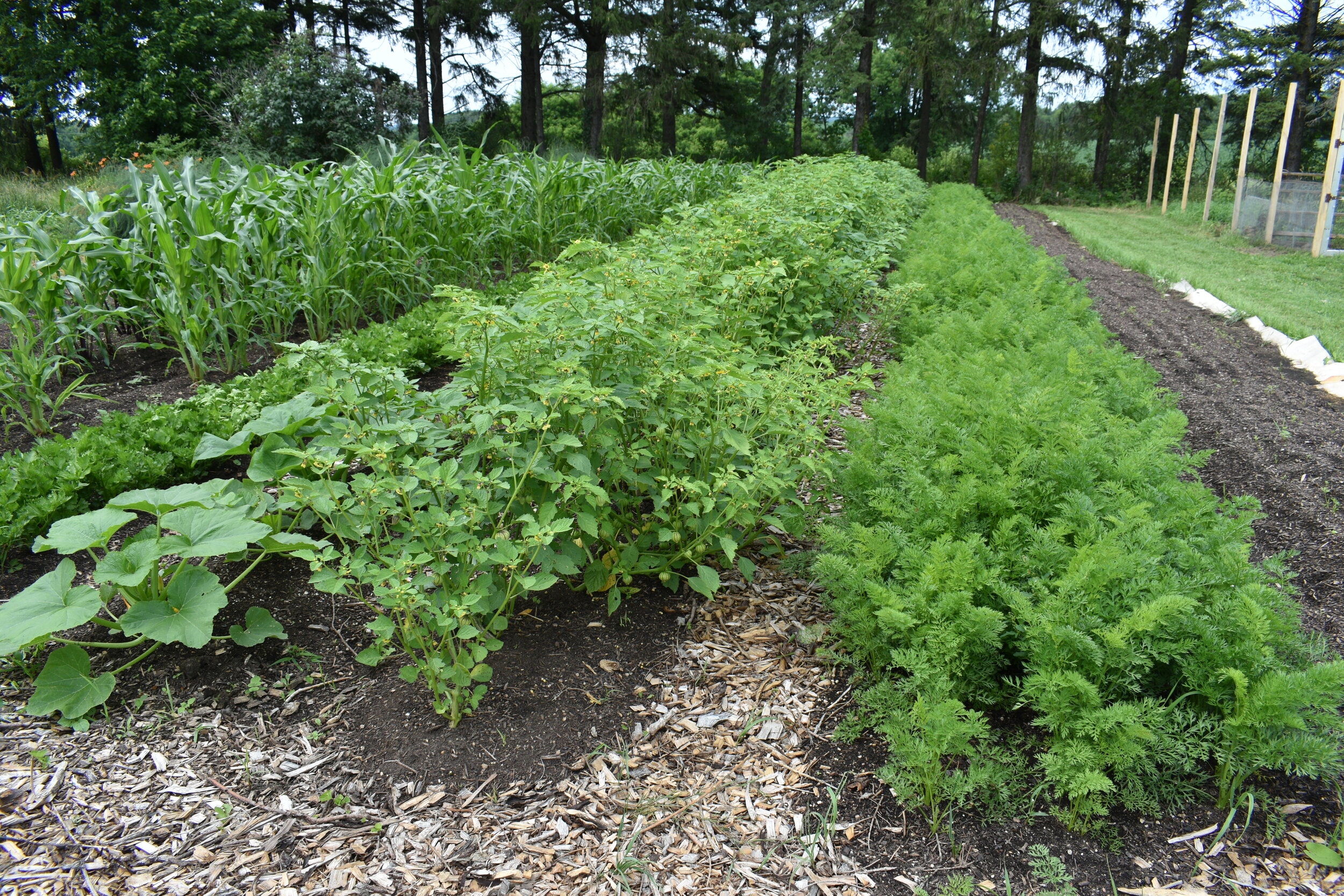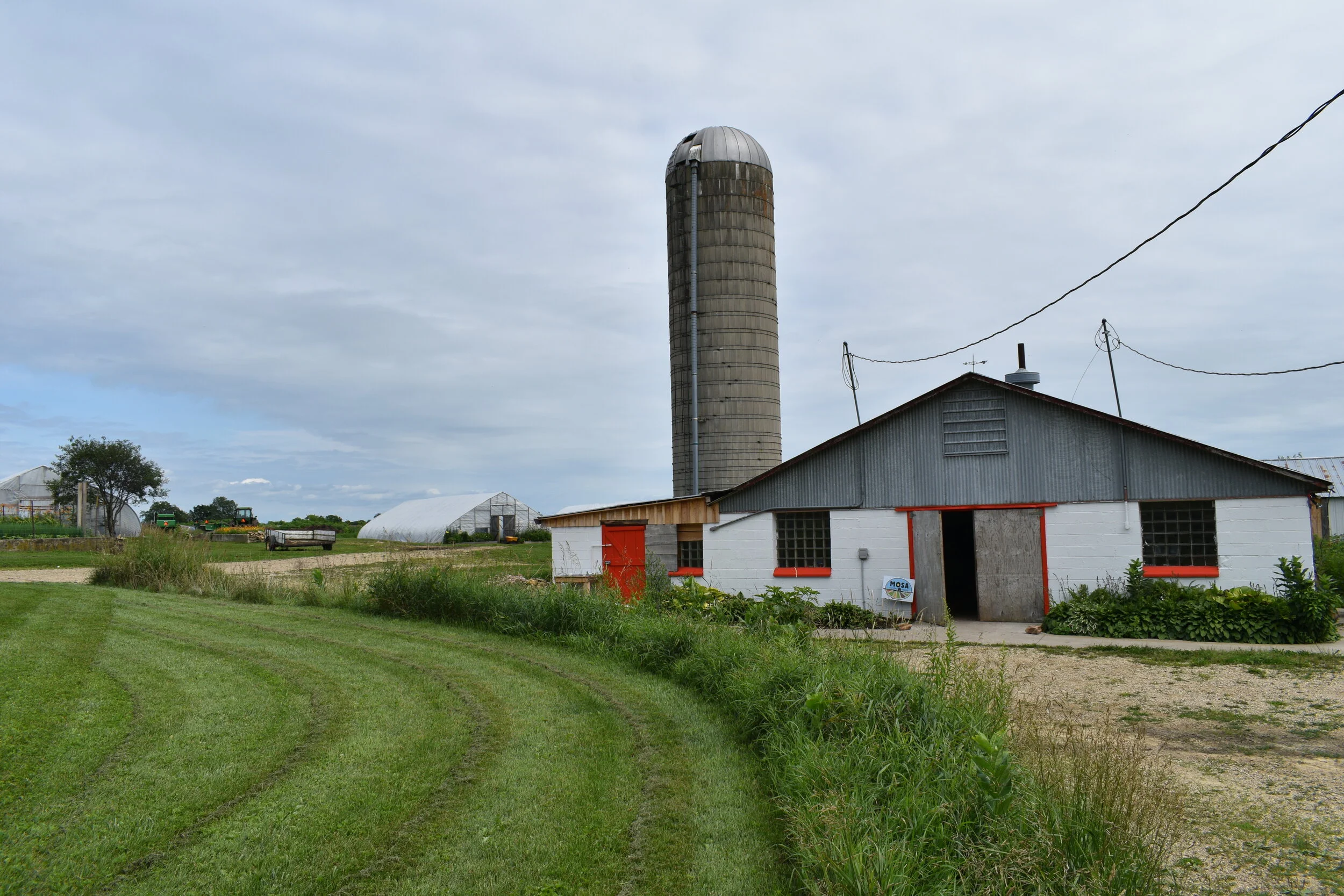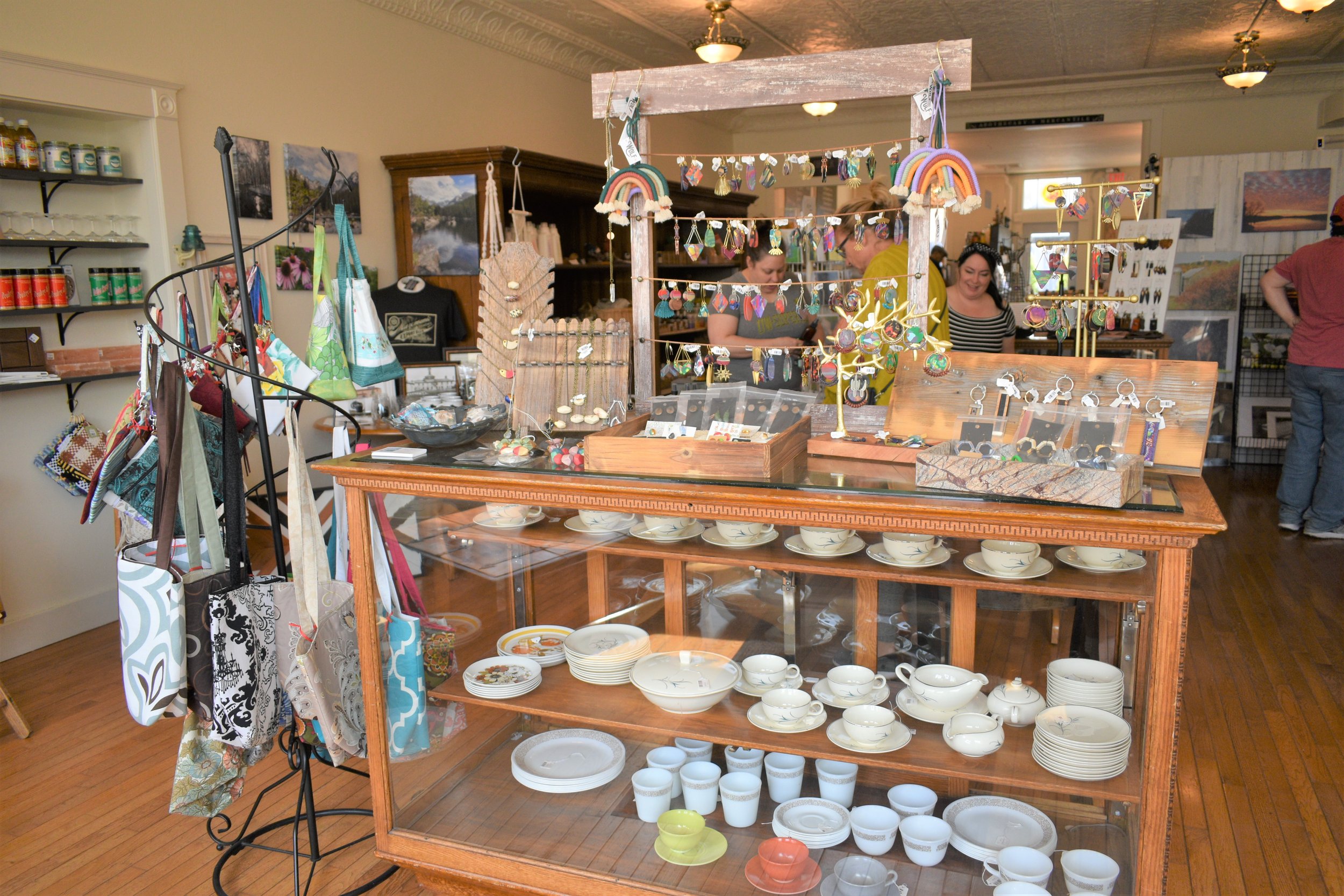Keewaydin Farms and Driftless Curiosity- a transformation
Today it seems there is a growing trend in healthy eating and more importantly, how food is sourced. With a growing number of small farmers turning to organic and responsible agricultural practices, Keewaydin Farms in rural Viola, Wisconsin is just one of these type of farms in the Wisconsin Driftless region.
Keewaydin (giiwedin), is an Ojibwe word meaning the North wind. The farm’s sprawling 200 acres was originally a traditional dairy operation started by Rufus Haucke’s parents back in 1976. Rufus referred to his parents as ‘hippie back-to-lander folks from the East coast of Wisconsin (the Milwaukee and Plymouth area)”.
According to Keewaydin Farms website, Rufus’s parent’s farm was not certified organic, but they held strong beliefs about their roles as stewards of the land. Spraying was kept to a minimum, and animals were given ample pasture to graze in the summer months.
As people who had come from urban environments, Rufus’s parents Richard and Mary Haucke, envisioned a farm where they would raise their children and instill in them the sense of community and family found in rural living.
The Hauckes bought the farm from a man named Linford Looker, who at the time, was looking to transition out of farming. “He had owned this place for 40 years before that, which is kind of cool because he actually did a little book on it, so we have a pictorial and sort of written history of the place. My parents turned it into a dairy farm. They milked 60 registered Holsteins and farmed until 1996. And then they, along with all the other small dairy farms went out of business. It was kind of a horrible time for the dairy industry and small family farms. They went out of business, their marriage fell apart, and we kind of just sort of all went our different ways and the farm sat empty. For a couple years actually, quite literally was sort of abandoned,” Rufus shared.
After a number of years, Rufus said he rediscovered the farm for himself. “I was living out in Colorado at the time and I just kind of kept coming back and fell in love with the place again. I got to a point where I was like 'well, what the hell are you doing in life man, you know like, where are you? What's your goal? What are you searching for? You have this piece of property at a dead-end gravel road and on a beautiful ridge top. Figure out what you want to do and make it work'. I was lucky enough to have support from my parents in the sense of like, ‘yeah, whatever you want to do, do it’. My mind and heart led me into the organic produce world. I was like 'well, I don't want a dairy farm, that's crazy. I think I'll try vegetable production’.”
That was about 16 years ago. Since then, Rufus has tried all kinds of different things and worked with different people. “I've done dairy farming, I've done crop farming, raised animals- pigs and chickens and eggs, honey, maple syrup, pretty much tried everything, and on different scales too,” he said smiling.
At one point Rufus, as he put it, was “slinging a lot of produce”. “Nowadays though, we kind of shrank it all down and now we're in a really fun spot where we're doing about two acres of produce up here, and making a little bit of hay on the rest of the ground, and got a bunch of greenhouses and we practice a style of gardening called no-till, so we kind of have really focused on the health of our soil and have been certified organic since 2004”.
The farm has 40 wooded acres, 60 acres of pasture, 90 acres that are tillable, and 10 acres of homesteaded area. Available learning space include: hiking trails, forest, maple syrup operation, fields, gardens, greenhouses, barn, shop, picnic area, pond, and pottery studio.
Rufus doesn’t do all this farming alone though; he has his wife Joy Miller right beside him after she joined the farm in 2017. Joy, born in Kendall, Wisconsin, graduated from Royal High School, and went on to study at UW-Madison and UW-LaCrosse. “In my undergrad, I studied English literature and multicultural literature mostly. When I graduated from UW-LaCrosse, I wanted to go into graduate school, but I didn't get into the schools I wanted to, so I decided I was going to move to Fairbanks, Alaska where my mother was living at the time.” Unbeknownst to Joy, her time in Fairbanks would prove crucial in her future at Keewaydin Farms and in forming Driftless Curiosity.
In Alaska, Joy worked for the Fairbanks North Star Borough School District for five years substitute teaching in many different schools, everything from young kids through high school and tech schools. Eventually, she found herself working for the Alaska Native Education Program, the Literacy Council of Alaska, and Fairbanks Native Association where she worked with the Drug and Alcohol Rehabilitation programs, as well as a wellness program focused on Alaska Native Youth Suicide Prevention and Mental Health Awareness.
Joy loved working with the Native community, and misses it today. “It was of a different fabric than I'd experienced here, it was tight knit, it was open, it was very loving, it was very, you know, based around food, it was very tied to the land, and those were things that I was just really drawn to.”
The work was very rewarding for Joy, but it also took a toll on her emotionally. Being alone, and the cold winters of Alaska, eventually led her back to Wisconsin in 2016. “I decided to come home and go back to school. So, I joined the master's program with John Hopkins University online and I started studying for a Master's of liberal arts. I started out with English literature again. I was looking at writing and lit and then I saw the liberal arts program was really broad and diverse and you can sort of pick from a lot of different humanities courses, so I sort of veered. I started to look more towards ethics and ethical leadership, environmental justice farming, and food justice.”
“In 2017, I moved to the farm, quit my job, broke my lease and brought my computer. I was happy I could come out here and started farming. I kind of took a deeper personal and academic dive into farming and food justice. I did my graduate research project on socially responsible food and ethical food consumerism in the Driftless. When I moved here, I saw a food community that I had not seen anywhere else, especially this little corner, the Southwest (Wisconsin) area.”
Joy ended up doing a study on the area to find out why people cared so much about food and if they actually spent more money on it. She found that people cared about organics, fair trade, and humanely raised, environmentally conscious food choices. This led her to wondering why. “So, the why reason is really what struck me and has sort of birthed Driftless Curiosity. One of the roots I found is it's the Driftless land itself that has thrust us into this different type of food community. The landscape is ridge tops and valleys. So, you've got ridge farms and you've got valley farms, and there's not a lot you can do in between. You've got the steep slopes, you've got the intricate streams, and you can't do wide scale farming like you can in flatter areas of Wisconsin or out in Iowa or Illinois. The land thankfully and mercifully forced people in this area to think differently. It started with a group of farmers who formed CROOP Cooperative, known today as Organic Valley in 1988. They decided to buck the system, they didn't want to go industrial farming, they didn't want to go capitalist. They decided to go collective, cooperative, and organic. They completely bucked the trend and went the other way, and they knew that they needed to cooperate and form a collective to be successful.”
Another important point that Joy found in her research is the back-to- landers, the hippies, the revolutionaries, had formed a counterculture. They saw organic eating differently as a way to say, ‘we're not going to eat this way, we're not going to go this way’, because of the really strong values about land stewardship that tied them to that.
Through her research, Joy also learned about the significance of having meaningful subjective experiences with the land. These experiences led to curiosity. This is what Rufus and Joy want to have happen when people come to Keewaydin Farms, thus Driftless Curiosity, where people slow down, connect to the land, to the food, to the farmer, and have this grounding experience. “A lot of people when I talk to them and ask them, ‘you know why do you eat this way?’, it is some meaningful personal experience that they had, they visited a farm and a light bulb went off, or they went to a farmers’ market and talked to someone who enlightened them about something that they were curious about. And that experience is something that I've seen people have at this farm. It's something that we're inspired to recreate, to have those meaningful moments where people slow down, connect to themselves, the land, the food, to the farmer, and have this grounding experiences. Consumer research shows it is these inner initiatives, these personal fulfilling experiences are much more likely to sway consumer patterns than advertising, information, or knowledge. It's something that happens inside and it's something that's tied to your emotional connectivity to those experiences.”
Rufus and Joy hold some basic principles at their farm that include being certified organic (2004), good organization, transitioning from 10 acres dedicated to produce down to 2 acres with more focus, and practicing no-till. “There are all kinds of funny words that we use to describe things traditional, like plowing the ground and tilling up land. We transitioned to this more urban style. As far as the inspiration that I got for it, some came from watching YouTube videos of guys doing small scale urban production, taking out their lawns and putting in gardens. Just kind of trying to capture more income per smaller chunk of land, that transition, and then in the last two years, transitioning into this no-till method where we haven't tilled ground at all this year. That's not an implement we use anymore in our gardens, we just put on heavy compost and grow beautiful produce,” Rufus said.
Rufus and Joy practice no-till by laying down cardboard on the lawn, then about a foot of clean compost, and taking plants from the greenhouse and placing them in those beds. In some beds they do just lay down seed. Both acknowledged the only tools they use are hand tools, but Rufus added he uses his skid steer to help around the farm. “It's a really fun tool and it helps us to move our dirt around or when laying down the heavy compost,” he said smiling.
Keeping in mind Driftless Curiosity’s mission; Deepening connections between people and the land through curiosity, experiential education, farming, social justice, and the Arts, Rufus shared about his and Joy’s journey with the Keewaydin Farms and starting their non-profit Driftless Curiosity. “It’s been absolutely fascinating just on our own accord,” Rufus said. He continued, “Just learning our own biases or learning just new things about this place where I've spent most of my life. It's learning new plants, and the curiosity that we have ourselves or the learning that we do ourselves when we host these classes that is fabulous. Bringing people out here and seeing their expansion is really encouraging and inspiring. I think a big part of it for us is having this conversation about our 200 acres of land. How do we redefine how we interact with the world? Right now, it feels like we're at this precipice of having to make a decision as a society, how do we want to move forward into the future? I think our path, it seems to me, is really filled with this idea of dominating things, whether it's people or the planet itself. I want to take this land and I want to look at it and say, how can we celebrate the fact that we exist as humans right now in the form we're in, and that there's all these other entities and beings and life forms out there that also want to exist. I feel that we're at a place and in the time period of this planet where it all could exist together. There's a lot of symbiosis in life if we allow it to happen. And that's where we're taking the farm or we're transitioning from more of an industrial farm model to a model that's more permaculturally based, but also something that goes beyond agriculture. What I want up here, what I want to do in particular, is prove that we can create a lot of food for people, we can grow a ton of calories for people, but we can also do that in a way that makes the surrounding environment better instead of degrading it. We had an experience a couple of weeks ago when it was the peak of the firefly season. It was this really cool evening, and I just got back from croquet, I walked out into our uncut field. Out there it was just a carpet of fireflies, just millions. It was beautiful! I looked over to the next-door neighbor's, which is just the industrial corn thing going on, and it was dead black. You know what, it's like, okay, you can grow corn we see that, but at the cost of everything else, including the health of our water and the life in our soil, it doesn't make sense. It doesn't seem like the equation is right. And whereas, where we've got our gardens, we're taking out lawn, which is kind of ridiculous in itself. I do actually like a little bit of lawn, but it's a ridiculous thing to mow your lawn. So why not take that lawn and turn it into something that's growing calories for people. Why not do that in a way that all the billions and zillions and trillions of life forms in the soil itself, where you don't mess all those up. Actually, if you leave them alone and let them do their thing, they're in a balance that creates a healthy bountiful crop without tinkering with stuff, without thinking 'oh we got to add this chemical or this nutrient or this mineral’, it is already there. It's there and available to plants if you leave those little critters alone let them do their thing instead of constantly tilling it all up and messing it up and thinking you need to do all these things to make it right. I mean, in fact, that's where I feel like both the farming that we are doing, and starting Driftless Curiosity are bringing up all these people with different sets of knowledge. That's where I want to take the second half of my life. Just keep on connecting with really cool people that are doing interesting things, that have a different story, and building this new identity of what it means to be human, and what it means to be stewards and gentler people and kinder people. I'm an optimist, I see that as a distinct possibility if we work together. There's some of these folks that I've talked to, that I listen to that are scientists that are smarter than me, that have done the experiments, and they are like, 'look if we stopped dicking around with stuff and messing things up and being jerks, we could write all this stuff in a decade maybe. We have the knowledge; we have the smarts. You look at Iowa, for instance, Iowa grows a crap ton of corn, they also contribute like 90% to the Dead Zone in the Gulf of Mexico Their tap waters are all messed up because we're putting all this nasty stuff out there that we don't need to do, we can stop doing that. And, you know, maybe with our smarts in a decade from now all that stuff could be cleaned up, and we'd be in a better shape because we'd be growing more food, we'd be growing more plant life, more animal life, than we are right now.”
Joy added, “Yeah, there's a lot of untruths, and slogans, like the agribusiness, biotech, capitalism, Monsanto, the huge big meat industry. That all is playing a huge governmental lobbying push for the policies that we have now. We need to change that storyline.”
Rufus and Joy feel what they are involved in is changing the narrative and telling stories and writing counter storylines to the larger story about food. There are a couple organizations, nonprofits, that they’ve watched that have inspired them to start Driftless Curiosity. One is Soulfire Farm in Petersburg, New York, and their Co-Director and Farm Manager, Leah Penniman who wrote the book Farming While Black. Joy saw her speak at the 2020 Moses conference, and Soulfire follows a similar model as Driftless Curiosity, a CSA farm, as well as an educational piece and social justice piece. Soulfire has a food sovereignty CSA (Community Supported Agriculture) program where they deliver CSA shares to people in New York for free. Community Supported Agriculture is a weekly box of food of whatever the farm is growing. They send out these boxes, as a community service basically to people who don't have food access. “We hear of this word food desert, and Leah Penniman, I’ve heard her speak on this, where we're not going to call it a food desert, because a desert is a natural occurrence, it's part of the natural world. Food deserts aren't naturally occurring. They call it food apartheid, because there's very political, very economic structures in place that restrict food access to people in certain sections of urban areas.
The other nonprofit is Angelic Organics Learning Center in Caledonia, Illinois. They're another CSA farm that has an education piece, and who are about connecting eaters and growers, helping to bring food into urban areas and making those connections. Joy feels there is a disconnect that people experience from farming, food, the food system, and the economics of it all. She feels a good example is how a grocery store provides a very limited scope into the food we eat. “That's one of the things we want to draw attention to out here, let's have that conversation, let's look a little deeper. Let's ask those hard questions and hear all of the different voices that should be a part of that conversation.”
Rufus and Joy have created a space for people to connect to the land in whatever pathway is open for them. Both feel with their mission of deepening people's connection to the land through curiosity, experiential education, farming, social justice, and the arts, provides a wide canvas of possibilities. Already offered in line with their mission are classes on foraging, maple syrup harvesting, writing, photography, permaculture and fly-fishing workshops, and stream studies. The couple want to continue collaborating with more people, collaborating that brings awareness of how others connect to the land.
As Driftless Curiosity’s programs grow, they will provide an attraction drawing more people to the farm. 2021 is Driftless Curiosity’s pilot season to find out what programs draw interest and whatpeople find meaningful.
As for the future, Rufus and Joy will continue to grow their CSA, promote current and new programs, and install a kitchen in plans to hold more on-farm dinners.
Over the next couple of years, the couple plan on developing the rest of the land bringing in prairie grasses, more life forms, more diversity. They want to bring in more of everything that makes sense, that needs a home. Rufus and Joy acknowledge there are all kinds of plants out there that need patches, all kinds of animals that need a place that isn't disturbed, with the understanding that their little chunk of land is going to be just one little chunk of a broader movement of land owners that are thinking of their land in a more holistic way rather than just a means of extraction from this amazing gift we all call Earth, that we all call home.
Visit Keewaydin Farms and Driftless Curiosity on Facebook, or on the web at: https://keewaydinfarms.com/ and https://driftlesscuriosity.org/.






















